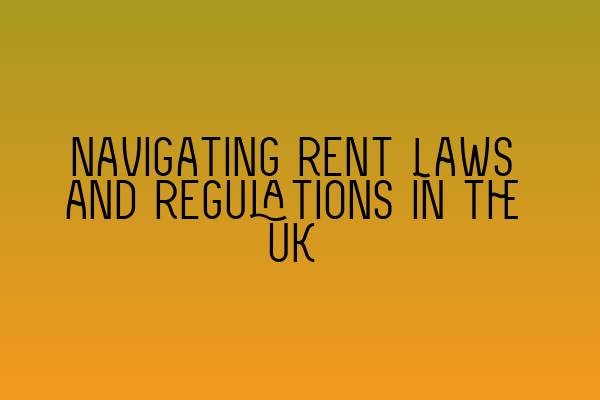Navigating Rent Laws and Regulations in the UK
Renting a property in the UK can be a complex process, especially with the numerous laws and regulations in place to protect both landlords and tenants. Whether you are a landlord looking to rent out your property or a tenant searching for a suitable place to live, it is vital to have a good understanding of the applicable rent laws and regulations to ensure a smooth and legal tenancy agreement.
Rent Acts in the UK
The UK has several rent acts that govern the relationship between landlords and tenants. The primary rent acts include the Rent Act 1977, the Housing Act 1988, the Housing Act 1996, and the Housing (Wales) Act 2014.
The Rent Act 1977 primarily applies to properties rented before 15 January 1989. It allows tenants to have security of tenure and limits the amount landlords can increase the rent.
The Housing Act 1988 covers most tenancies granted after 15 January 1989. It introduced the Assured Shorthold Tenancy (AST), which is the most common type of tenancy in the UK. ASTs usually have a fixed term of six or twelve months, after which the tenancy can continue on a periodic basis.
The Housing Act 1996 introduced housing-related support for vulnerable individuals and families, such as those in need of temporary accommodation or social housing.
The Housing (Wales) Act 2014 specifically applies to properties in Wales and includes provisions on the registration and licensing of landlords and agents, as well as rules on rent repayment orders.
Rent Increase Regulations
Landlords in the UK have the right to increase the rent, but they must follow specific regulations to do so legally. The amount and frequency of rent increases can depend on the type of tenancy agreement, as well as any terms specified in the contract.
For Assured Shorthold Tenancies (ASTs), landlords can increase the rent once the initial fixed term ends. The rent increase must be reasonable and must follow the guidelines set out in the rent act applicable to the tenancy.
It is important to note that landlords cannot increase the rent during a fixed term unless there is a provision in the tenancy agreement allowing for it. Landlords must also provide tenants with the required notice period before implementing a rent increase.
For properties subject to the Rent Act 1977, the landlord’s ability to increase the rent is limited, and they must follow specific procedures to do so.
Tenant Rights and Responsibilities
Tenants in the UK have certain rights and responsibilities that are protected by law. Some of the key rights include the right to live in a safe and habitable property, the right to have repairs carried out in a timely manner, and the right to challenge excessively high rent increases.
On the other hand, tenants also have responsibilities, such as paying the agreed-upon rent on time, taking care of the property, and complying with the terms of the tenancy agreement.
It is essential for both landlords and tenants to have a clear and comprehensive tenancy agreement that outlines the rights and responsibilities of each party. This helps to avoid disputes and ensures that both parties are aware of their obligations.
Dealing with Disputes
If a dispute arises between a landlord and tenant, there are several options available for resolution. The first step is usually to try and resolve the issue through direct communication and negotiation.
If this proves unsuccessful, either party can seek assistance from a professional mediator or take the matter to the relevant ombudsman or dispute resolution service. In some cases, it may be necessary to involve the courts for a legal resolution.
It is important to keep proper records of any correspondence, agreements, or disputes throughout the tenancy. This documentation can be crucial in the event of a dispute, as it provides evidence of any breaches or violations.
Conclusion
Navigating rent laws and regulations in the UK can be challenging, but having a good understanding of the applicable legislation is essential for both landlords and tenants. By familiarizing yourself with the relevant rent acts, understanding rent increase regulations, knowing your rights and responsibilities, and knowing how to handle disputes, you can ensure a smooth and legally compliant tenancy agreement.
If you have any questions or need further assistance with rent laws and regulations, don’t hesitate to contact us at SQE Property Law & Land Law. Our team of solicitors are well-versed in all aspects of property law and can provide expert advice and guidance.
Misrepresentation in Contracts: Unveiling Deceptive Practices
SQE Contract Law: Analyzing Landmark Cases and Influential Judicial Decisions
Understanding Contractual Capacity: Rights and Limitations
Interactive SQE Mock Tests for Contract Law: Test Your Knowledge
Join Our SQE Contract Law Webinars: Expert Insights and Guidance
